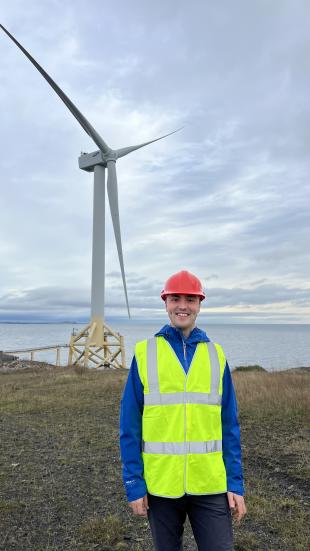EngD Project Title: Environmental modelling and assessment of opportunities for the transition to a sustainable marine economy.
Industrial Partner: The Crown Estate
Educational & Professional Background
I graduated with a master’s degree in physics from Swansea University, after which I completed a PGCE in Secondary Science and taught for two years. While I valued the experience and the skills that I developed - particularly in communication, organisation, and leadership - I came to realise that teaching was not the long-term career path for me. I was drawn back to academia and eager to apply my background in physics to a field where I could contribute to meaningful, real-world change.
What attracted you to studying with IDCORE?
The IDCORE programme stood out to me because of its unique blend of academic and industry experience. The taught year at the University of Edinburgh offers a comprehensive overview of the offshore renewable energy sector, which is especially valuable as I transition into this field. Throughout the course, there are numerous opportunities for exposure, allowing me to engage with both academic research and industry practice, and benefit from the strengths of each.
What attracted you to the renewable energy sector?
My interest in the renewable energy sector was first sparked while teaching science, specifically when covering topics related to sustainability and climate change. Discussing these issues with students made me reflect on the scale of the challenge we face, but also the opportunities for innovation and impact.
What truly drew me to this field is the crucial role it plays in addressing climate change. Renewable energy, particularly offshore renewables, will form the backbone of a sustainable, net zero energy system. The prospect of being involved in an industry that’s not only growing rapidly, but also essential for our collective future, is incredibly exciting.
Coming from a physics background and having developed strong communication and organisational skills through teaching, I saw a clear path into the sector - especially in areas that involve connecting technical knowledge with broader policy and economic frameworks.
What aspect of the industry do you find the most inspiring, interesting or important for the future?
What I find most inspiring about the offshore renewable energy industry is its direct role in addressing climate change. It’s a sector that sits at the intersection of environmental urgency and economic opportunity, and I’m particularly drawn to how it can drive both climate benefits and sustainable growth.
I’m especially interested in how policy can shape this transition - unlocking innovation, accelerating deployment, and ensuring that offshore renewables become a reliable, economically viable cornerstone of the UK’s future energy mix. That’s what motivates me - the opportunity to contribute to the development of technologies and strategies that will have both immediate impact and long-lasting significance.
What ambition would you like to fulfil as a research engineer?
As a research engineer, my ambition is to gain a truly holistic view of the renewable energy sector - one that allows me to understand and engage with people across the entire spectrum, from technical engineers to policymakers and business leaders. I want to be able to have meaningful conversations with all parts of the sector and help connect the dots between them.
A key goal for me is to bridge the gap between technical and non-technical teams. I see real value in being someone who not only understands the engineering behind solutions but can also communicate them clearly and shape strategies that drive impact. I want to develop both my technical engineering expertise and my communication and leadership skills, so I can contribute to well-informed, collaborative plans that move the sector forward.
What excites me most is the opportunity to work with a wide range of people - across academia, industry, and policy - and help align their efforts toward a shared vision of a more sustainable, net zero future.







